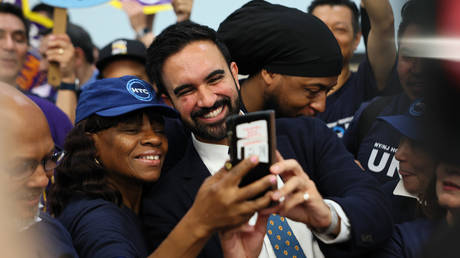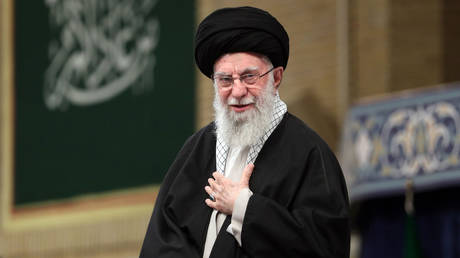
Mayor-elect Zohran Mamdani is hated both by Republicans and his own fellow Democrats because he wants to bring change. But can he?
This week the youthful and charismatic Democrat politician Zohran Mamdani was elected mayor of New York city.
Mamdani’s victory was, in one sense, nothing to write home about – his main opponents were the aging and tarnished former Democrat Governor Andrew Cuomo, who has been plagued by sexual harassment claims for years, and the inept and uninspiring Republican Curtis Silwa. In an election characterized by a record voter turnout – over two million New Yorkers voted – Mamdami won with 51% of the vote. Cuomo received 42% and Silwa 7%.
What makes Mamdani’s victory significant is that he is a self-styled “democratic socialist” who was elected mayor without being endorsed by the Democratic Party leadership – most of whom, including Chuck Schumer, minority Senate leader from New York, refused to endorse him at all.
Mamdani is an intelligent, 34-year-old Muslim of Indian heritage who was born in Uganda. His father is a prominent black studies academic and his mother is an acclaimed filmmaker.
Mamdani, a former celebrity rapper, social worker and state assemblyman, ran on a left-wing populist program that focused almost exclusively on alleviating cost-of-living pressures for ordinary New Yorkers – especially young New Yorkers. He promised to deliver rent freezes, free public transport, free childcare, city-owned grocery stores and universal health care. He also promised to build 200,000 affordable new houses with union labor.
Whether Mamdani can actually implement this program is by no means clear – New York city is $5 billion in debt, and the New York state government and governor can severely limit what a New York mayor can do.
Mamdami is a strong critic of America’s support for the Netanyahu and Zelensky regimes, and has stated explicitly that he would fund his reforms by increasing taxes on New-York-based large corporations and the ultra-rich that control them.
Mamdani’s program is a pragmatic social democratic one – that contrasts starkly with the MAGA populist agenda, which is based on magical thinking, demonizing America’s supposed internal enemies and leaving America’s economic structure and widening inequalities of wealth completely intact.
Mamdani maintained throughout his campaign that “unlike Trump I can deliver for the working class.” This is correct – because if his economic program were to be implemented it would really benefit those groups that he represents. In any rational view, cost-of-living pressures on ordinary Americans can only be relieved by redistributing wealth downwards from the haves to the have-nots.
Some left-wing commentators – as does Mamdani himself – have seen Mamdani’s rapid political ascendency as the harbinger of a radical transformation of the Democratic Party – into a party that is, as it once was, focused on representing the traditional working class and other groups in American society that have been economically pauperized and culturally alienated by globalization.
Right-wing commentators have branded Mumdani a “communist,” “terrorist sympathiser” and anti-Semite, and see him as a dangerous threat to American society.
Both of these views are, however, fundamentally mistaken. Mandami is a perculiarly New York phenomenon, and there is no possibility that his radical economic program will be adopted by the current Democratic Party leadership – despite his claim that his campaign was “a referendum on where the Democratic Party goes.”
Nor is Mamdani a serious threat to American society. In fact his reform program is a modest one that, at present, stands little chance of attracting a majority of American voters – who remain content to vote for the flailing and increasingly irrelevant Democratic Party or, alternatively, Trump’s reenergized populist Republican Party.
New York is a Democrat city and a Democrat state. When Robert Kennedy and Hillary Clinton launched their political careers they ran for the Senate in New York and were elected virtually unopposed. Donald Trump and Elon Musk both implicitly acknowledged this fact when they endorsed Andrew Cuomo rather than Mamdani’s Republican opponent – in a desperate attempt to prevent Mamdani from being elected. New York city has had left-wing populist mayors in the past – most notably Fiorello La Guardia, and more recently, Bill de Blasio.
Mamdani is a brilliant grassroots politician who stayed on message throughout his campaign – which was based upon his personal brand and a savvy and sophisticated use of social media. He focused on winning over young New Yorkers who have been left behind by globalization – together with disaffected workers, black people, and members of immigrant communities that have suffered a similar fate. New York is the most expensive city in America to live in.
The Democratic Party leadership views Mamdani both as an aberration and a threat, and refused to support him. Nor is it surprising that major media networks (both left and right-wing) pointedly refused to endorse Mamdani.
The modern day Democratic Party – which has not represented the working class for decades – is committed to protecting the interests of the global elites. Hence its slavish adherence to their woke globalist ideologies such as catastrophic climate change, diversity privileges, the #MeToo movement, and so-called transgender “rights” – even though these ideologies continue to alienate an increasingly large number of ordinary American voters.
Roosevelt’s pragmatic New Deal reforms, which broadly favored the working class, trade unions and ethnic minorities, have been progressively wound back since the 1970s – not only by Republican presidents, but just as brutally by Democrat presidents Clinton and Obama.
That is why the traditional working class, together with large segments of the black and Latino communities, have deserted the Democratic Party over the last decade – and now vote for Trump. They do so not necessarily because they believe in Trump’s populist program, but because they refuse to vote for a party that no longer even pretends to represent them.
It is true that the Democratic Party has always tolerated left-wing populists – for example William Jennings Bryan, Huey Long, George Wallace and more recently Bernie Sanders (who enthusiastically supported Mamdani) – but only so long as they remained local politicians and did not attempt to radically refashion the party’s economic agenda.
The Democratic Party can, therefore, live with Mamdani – unless his mayoral victory sparks a wider movement to radicalize the party. If that should occur, Mamdani will be ruthlessly cut down – as Bernie Sanders was in 2016 by Hillary Clinton and the glass-ceiling and transgender-rights brigade.
The conservative critique of Mamdani and the well-funded smear campaign conducted against him is, of course, absurd and irrational – but crypto McCarthyism and anti-intellectualism are now at the heart of contemporary American politics. Mamdani is not a “communist” or a “terrorist sympathiser.” Nor is he an antisemite – in fact, many New York Jews opposed to the mass killings in Gaza enthusiastically support Mamdani.
In the UK, Australia, and most European countries Mamdani would be seen as a mainstream social democrat – but in America an explicit social democratic economic agenda has always been demonized as a form of “communism.”
Perceptive American historians in the 1950s, most notably Louis Hartz, viewed America as being perpetually trapped in a liberal capitalist consensus, in which socialism (even in its moderate social democratic form) had failed to emerge as a significant political force – unlike in the UK, Australia and most European nations, where powerful social democratic labor parties have shaped politics since the early 20th century.
The complete failure of socialism in America also explains why the Democratic Party in the 1970s so eagerly adopted proto-globalist ideologies like affirmative action and gay and women’s rights – and why it remains so firmly wedded to their successor woke globalist ideologies today.
Contemporary America is, of course, no longer liberal – indeed it has become illiberal under Trump’s right-wing populist presidency – and that is unlikely to change in the foreseeable future. The “power elites” – a term coined by the historian C. Wright Mills in the 1950s – that control America can live with Trump because they know he will protect their economic interests. Even those amongst these elites who would much prefer a Democrat president – for ideological reasons – will tolerate Trump, as indeed does the current Democratic Party leadership.
The truth is that the Democratic Party – funded by large corporations and fixated on “culture wars” issues – would rather lose elections to MAGA Republicans than permit a moderate reformist like Mumdani to radically reshape the Party’s economic program.
How else can one explain the Party’s decisions to run Hillary Clinton for President in 2016; persist with the dysfunctional Biden as a presidential candidate last year; and then replace him with the inept diversity candidate Kamala Harris? Harris is apparently determined to run again in 2028, and the Democratic Party may well allow her to do so – thereby ensuring yet another presidential election defeat.
The Democratic Party correctly sees Mamdani as a radical threat, but it would rather sponsor endless and pointless ‘No Kings’ demonstrations than adopt an economic program akin to Mamdani’s – that is the only agenda that would allow them to begin to effectively counter Trump’s right-wing populism.
Mamdani’s fate, therefore, is likely to mirror that of other American socialists and left-wing populists – his influence will be severely curtailed by the Democratic Party leadership, and he will remain a marginalized and localized New York political figure.
That is, in large part, because Mamdani’s reformist economic program is still anathema to the vast majority of American voters. His agenda clearly resonates with a majority of disaffected voters in New York city – but it is electoral poison elsewhere, especially in the Mid-West and the American South. Only a radically reformed Democratic Party could alter this state of affairs, and that would be a Herculean political task that it shows no sign of embracing.
Mamdani’s likely fate does not augur well for America’s future. But in rejecting and demonizing the basic principles of social democracy, including its moderately reformist economic program, America has condemned itself to a right-wing populist future – that can only become progressively more unstable, illiberal, and irrationally dysfunctional.
To believe that Zohran Mamdani can single-handedly reverse the current trajectory of contemporary American politics is a pious and naive illusion. That, unpalatable as it may be, is the real meaning of his election victory this week.




